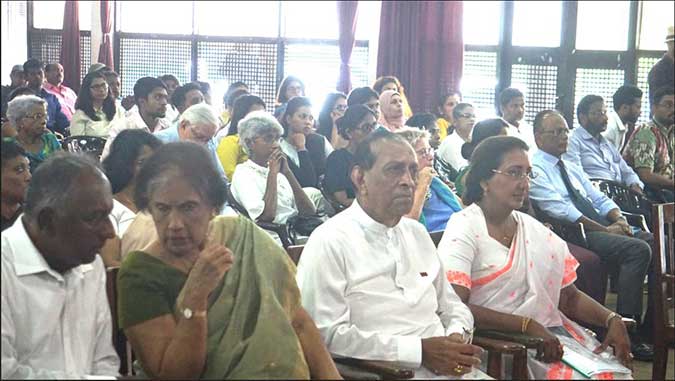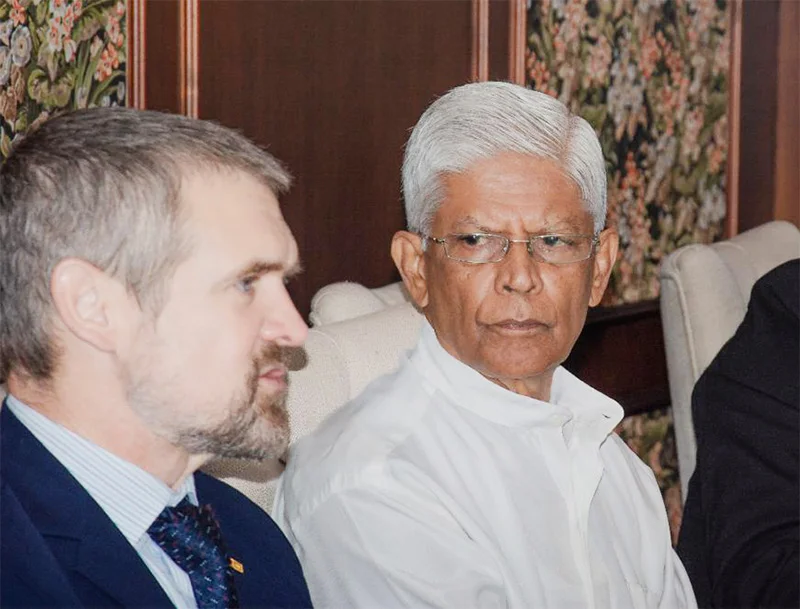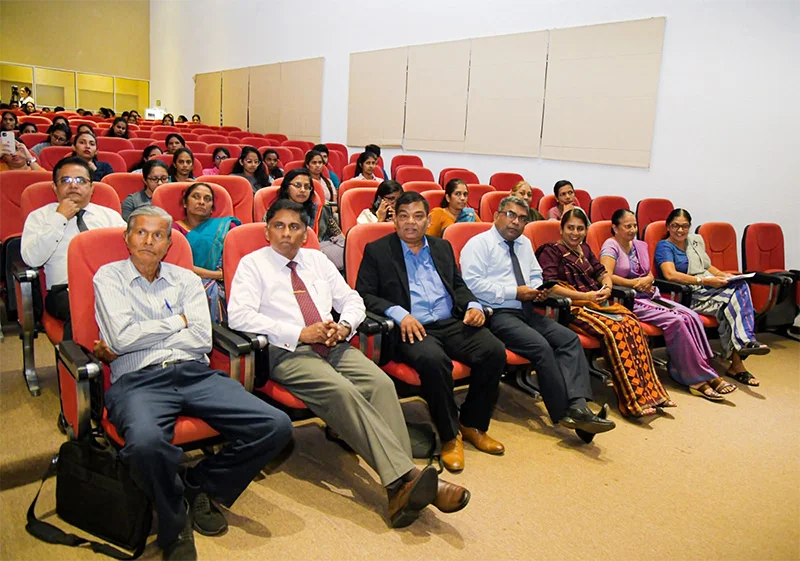Business
‘Chronicles of Melancholy’ – sneak preview launched

Stop Child Cruelty Trust (SCC) with Child Protection Alliance (CPA) launched another historical event to protect and promote the rights of children across Sri Lanka. From 2020 to 2022, seventeen children were physically/sexually abused and murdered, and no person of authority has done anything meaningful to resolve the child protection crisis on the island. ‘Chronicles of Melancholy’ (නොරිදවිය යුත රිදෙන කතන්දර) is a collection of true-life stories of victims/survivors of various forms of child abuse to be published in Sinhala, Tamil and English to create awareness of the escalating crisis. The first heartbreaking story, ‘Stilled Tears – Faded White Garb’ (‘නිසල වී ඉකිබිඳුම – මිලින විය සුදු පියුම), was released as an introduction to this masterpiece.
‘Stilled Tears – Faded White Garb’ is the tragic story of a sixteen-year-old Varuni who was subjected to unimaginable mental and verbal abuse by the Principal which, made her end her own life. Speaking about the story, Dr Tush Wickramanayaka, Chairperson of SSC, Co-convener of Child Protection Alliance and Global End Violence Champion, said, “The most unique thing about this book is that it’s authored by young Dinithi Gunathilaka, the winner of the Best Speaker award at the National Inter-school Debate Competition ‘A Generation’s Appeal 2021’. Dinithi was the Captain of the debate team of Sirimavo Bandaranaike Vidyalaya, Colombo 7.”
Dr Wickramanaya added, “Children are the most vulnerable members of a community who require protection from adults. It’s incredibly gut-wrenching to see the trauma children go through because they are easy targets of abuse. We hope the launch of Varuni’s story will start a movement encouraging many voiceless victims to share their stories. Our final objective is to empower children, raise public awareness and educate.”
“The final publication of ‘Chronicles of Melancholy’ will have experts giving valuable and practical advice on child psychology, parenting, legal, etc. We hope that by sharing these stories victims and survivors can use the book as a tool for healing and education. The book will be initially published in Sinhala, Tamil and English. We aim to have it published in other languages as well and are currently negotiating to get the book published in two UN-recognized regional languages. This would be the first time such a book will be published,” Dr Wickramanayaka further added.
Chandrika Bandaranaike Kumaratunga, The Former President of Sri Lanka, speaking at the event, said, “It’s appalling to hear the number of deaths and cases of abused children in Sri Lanka in the past year. Authorities should resolve the child protection crisis without politicizing matters by working cohesively with NGOs and other such organizations. I would say that creating awareness via books such as ‘Chronicles of Melancholy’ is essential. There is a need to educate people about the dangers and horrors of child abuse. Not just sexual abuse, but other acts of violence against children, I applaud the efforts of Stop Child Cruelty Trust and the Child Protection Alliance in trying to find solutions to the current child protection crisis in Sri Lanka”.
Prof. Sarath Wijesooriya, Author, Senior Lecturer at the University of Colombo, speaking on the impact of child abuse, stated, ” Children are the future of our country there is a need to educate and create awareness on what child abuse is, that it can be prevented and addressed before children fall prey to social predators. Child abuse can be defined as the physical, sexual or emotional ill-treatment or neglect of children. Sometimes a lack of understanding could be the contributor to this rapidly growing social phenomenon. We must educate the general public on this as knowledge can be a powerful tool to overcome child abuse. The more aware people become of its occurrence, the more society can do to prevent such abuse. I believe a book such as Chronicles of Melancholy in all languages with details on how to mitigate abuse is vital for our society.”
The event had excerpts from Varuni’s story read by Child Protection Ambassadors Saranga Disasekara, Abisheka Fernando, Dinakshie Priyasad, Niranjani Shanmugarajah and Harith Wijeratne with a visual dance performance by Stagecraft, School of Performance Art. At the event, they launched the art competition, ‘Me Unhurt – Stop Child Abuse’, which will be open to children between the ages of 16 and 18 years. The winning artwork from the entries will adorn the book cover to be launched in October to signify International Children’s Day.
To enter the competition, please send your entry on an A4 size Kent paper or Watercolor paper, before July 7th, 2023 to Stop Child Cruelty Trust, 115 Kynsey Road, Colombo 8. Please include the following information at the back of the entry: your name, date of birth, address, telephone number, and grade in school. Please get your artwork certified by either a parent/guardian or school teacher with the following text: I certify this is a creation of (name of the child, date and the full name and signature of the adult). For further information, please contact Stop Child Cruelty Trust at 0771656867 or www.stopchildcruelty.com
Stop Child Cruelty Trust was established in 2018 to end violence against children and end corporal punishment. In 2021 SCC spearheaded the formation of the Child Protection Alliance, a coalition of credible civil society organizations working to protect and promote the rights of children. In 2022 SCC pioneered the establishment of UNICEF-style celebrity Child Protection Ambassadors. Their most commended achievement was in 2022 when SCC was the sole representative defending 5.2 million children of Sri Lanka at the 42nd session of the Universal Periodic Review of UNHRC in Geneva. On 1st February 2023, at the Sri Lanka sessions, SCC convinced a record number of countries to make recommendations on child rights, including prohibiting corporal punishment unequivocally.
Business
How middle powers cooperate to achieve shared goals

‘Australia’s engagement with institutions, such as the Indian Ocean Rim Association (IORA) and “minilateral” platforms, including the Quad and the Combined Maritime Force, are practical examples of middle powers working together to address shared challenges ranging from ocean piracy to humanitarian assistance, Australia High Commissioner to Sri Lanka Matthew Duckworth said at a recent round table forum featuring the media and other important sections, held at the Colombo Club of the Taj Samudra Hotel on the topic ‘Middle Power Diplomacy.’
The forum was organized and conducted by the Pathfinder Foundation of Sri Lanka under the moderation of the latter’s Chairman, Ambassador (Rtd.) Dr. Bernard Goonathilake.
High Commissioner Duckworth underscored that such cooperation is not directed against any particular country but aims to preserve an open, inclusive, and rules-based regional order.
H.C. Duckworth acknowledged the reality of major power competition while stressing that Australia seeks stable and respectful relations with all countries, including Sri Lanka, cooperating where possible and disagreeing where necessary, without compromising core national interests.
Further, the H.C. focused on India’s evolving role in the Indian Ocean, the trajectory of China’s rise, the durability of the current global order, alliance dynamics, and Sri Lanka’s positioning in the Indian Ocean.
Responding to a question about India, the High Commissioner affirmed that Australia expects all major powers—India, China, and the United States—to act transparently and to respect the sovereignty of smaller states. On whether the current emphasis on middle-power diplomacy is a temporary shift or a long-term trend, the High Commissioner stated that middle powers must now play a more visible and proactive role in sustaining international norms and institutions.
H.C. Duckworth added that Australia invests in Sri Lanka in sectors, such as, minerals, renewable energy, textiles and education services. The High Commissioner reiterated Australia’s support for open trade and deeper regional economic integration, emphasizing the importance of economic resilience in a contested global environment.
The Pathfinder Foundation is a Colombo-based think tank dedicated to fostering informed dialogue on foreign policy, economic development and strategic affairs.
By Hiran H Senewiratne
Business
Green Minds: A new platform to rethink environmental governance in Sri Lanka

The Ministry of Environment yesterday launched a new knowledge-sharing platform titled Green Minds, aimed at strengthening environmental thinking and institutional capacity among public sector officials, at a time when Sri Lanka is facing mounting ecological stress and climate-related challenges.
The inaugural session of the monthly programme was held on February 12, 2026, at the Ministry auditorium under the patronage of Secretary to the Ministry of Environment, K. R. Uduwawala, with the participation of senior officials from the Ministry and its affiliated institutions.
Addressing the gathering, Secretary Uduwawala said that Green Minds was designed not merely as another training initiative, but as a thinking space for public officials to critically engage with emerging environmental concepts and global best practices.
“Environmental governance today is no longer limited to regulations and enforcement. It requires new ways of thinking, interdisciplinary approaches and continuous learning. Green Minds is intended to become a platform where officials can reflect, debate and update themselves on these evolving realities,” Uduwawala said.
He stressed that Sri Lanka’s environmental institutions must move beyond routine administrative practices and embrace knowledge-driven policy making, particularly in areas such as climate adaptation, biodiversity conservation, sustainable resource management and environmental justice.
The keynote lecture at the inaugural session was delivered by Senior Professor Siri Hettige, who spoke on the role of social sciences in achieving sustainable development in Sri Lanka. He highlighted the often overlooked social dimensions of environmental problems.
“Environmental issues are not purely scientific or technical. They are deeply social. Human behaviour, consumption patterns, inequality and governance structures all shape environmental outcomes,” Prof. Hettige said.
“If we want sustainability, we must understand society as much as we understand nature.”
He pointed out that many environmental policies fail because they do not adequately consider community realities, livelihoods and social power relations.
“You cannot conserve forests without understanding people. You cannot manage waste without understanding urban lifestyles. Sustainability is fundamentally a social project,” he added.
Following the keynote, a high-level panel discussion on strengthening environmental awareness brought together Prof. Hettige, Dr. Herath Vidyaratne, environmental policy analyst, Ravindra Kariyawasam, Adviser to the Minister of Environment, and S. C. Palamakumbura, Conservator General of Forests.
Kariyawasam said Sri Lanka was at a critical juncture where environmental decision making must be aligned with national development priorities.
“We can no longer treat the environment as a separate sector. It has to be integrated into economic planning, infrastructure development and social policy. Green Minds offers a space for officials to think beyond institutional silos,” he said.
Dr. Vidyaratne stressed that environmental literacy among state officials was essential in responding to complex challenges such as climate change, water scarcity and ecosystem degradation.
“The problems we face today are interconnected. Climate change is linked to food security, public health and migration. Officers need systems thinking, not just subject knowledge,” he said.
Meanwhile, Palamakumbura highlighted the importance of translating environmental awareness into institutional action.
“We have knowledge, laws and policies. What we need is consistent implementation and a shared environmental ethic across all institutions. Platforms like Green Minds can help build that collective responsibility,” he said.
He noted that forest conservation, wildlife protection and ecosystem restoration could not succeed without inter-agency cooperation and informed decision makers.
By Ifham Nizam
Business
Third quarter financials highlight 30% PBT growth for Aitken Spence in FY 2025/26

Spanning tourism, maritime and freight logistics, strategic investments and services, with operations across the region, Aitken Spence PLC, with a legacy of over 157 years, continues to pursue excellence. The Group recorded revenue of Rs. 67 billion for the nine months ending 31st December 2025, underscoring a robust performance across its portfolio of industries. The Tourism sector accounted for 68% of Group revenue, while the Maritime & Freight Logistics sector and Strategic Investments sector contributed 18% and 12% respectively. Furthermore, the Group’s revenue for the third quarter improved by 3.8%, reflecting steady performance across key sectors.
The Group’s total Profit Before Tax (PBT) stood at Rs. 5.6 billion for the nine months ending 31st December 2025, compared to Rs. 4.3 billion in the corresponding period of the previous year, reflecting a growth of 30%. Correspondingly, the Group’s Profit After Tax improved by 42% to reach Rs. 3.4 billion.
Sectoral Performance
The Tourism sector recorded the most notable improvement during the period under review, reporting a Profit Before Tax (PBT) of Rs. 2.0 billion for the nine months ended December 2025. This performance was primarily attributable to the sustained recovery and growth of the tourism industry in Sri Lanka. In addition, the sector benefited from significant improvements in profitability at the Group’s Maldivian resorts, as well as enhanced operating performance across hotel operations in India and Oman.
The Group’s Maritime & Freight Logistics sector was the largest contributor to Profit Before Tax for the period under review, reporting a Profit Before Tax of Rs. 3.3 billion. Sector performance, however, was moderated by lower volumes and margin pressures, particularly impacting overseas freight and airline operations. This was reflected in the reduced contribution from the sector’s equity-accounted investee for the period.
In the Strategic Investments sector, the key contributing segments of printing and plantations both recorded stellar performance for the period under review despite the challenging market conditions of these industries, while the power generation segment witnessed a steady performance with notable contributions from the Waste-to-Energy and renewable power generation operations. However, the significant losses incurred in the apparel manufacturing segment impacted the overall performance of the sector, resulting in a loss of Rs. 652 million at PBT level.
The Services sector recorded strong growth during the period under review, driven primarily by the expansion of operations at Port City BPO, the Group’s most recent investment. This performance was further supported by improvements in performance by the Group’s elevators segment. As a result, the Services sector reported a Profit Before Tax of Rs. 843 million, compared to Rs. 114 million in the corresponding period of the previous year.
The period was marked by notable achievements:
Aitken Spence PLC became the first and only diversified holdings company in Sri Lanka to have its climate targets validated by the Science Based Targets Initiative (SBTi).
-

 Life style2 days ago
Life style2 days agoMarriot new GM Suranga
-

 Business1 day ago
Business1 day agoMinistry of Brands to launch Sri Lanka’s first off-price retail destination
-

 Features2 days ago
Features2 days agoMonks’ march, in America and Sri Lanka
-

 Midweek Review6 days ago
Midweek Review6 days agoA question of national pride
-

 Business6 days ago
Business6 days agoAutodoc 360 relocates to reinforce commitment to premium auto care
-

 Opinion5 days ago
Opinion5 days agoWill computers ever be intelligent?
-

 Features2 days ago
Features2 days agoThe Rise of Takaichi
-

 Features2 days ago
Features2 days agoWetlands of Sri Lanka:













